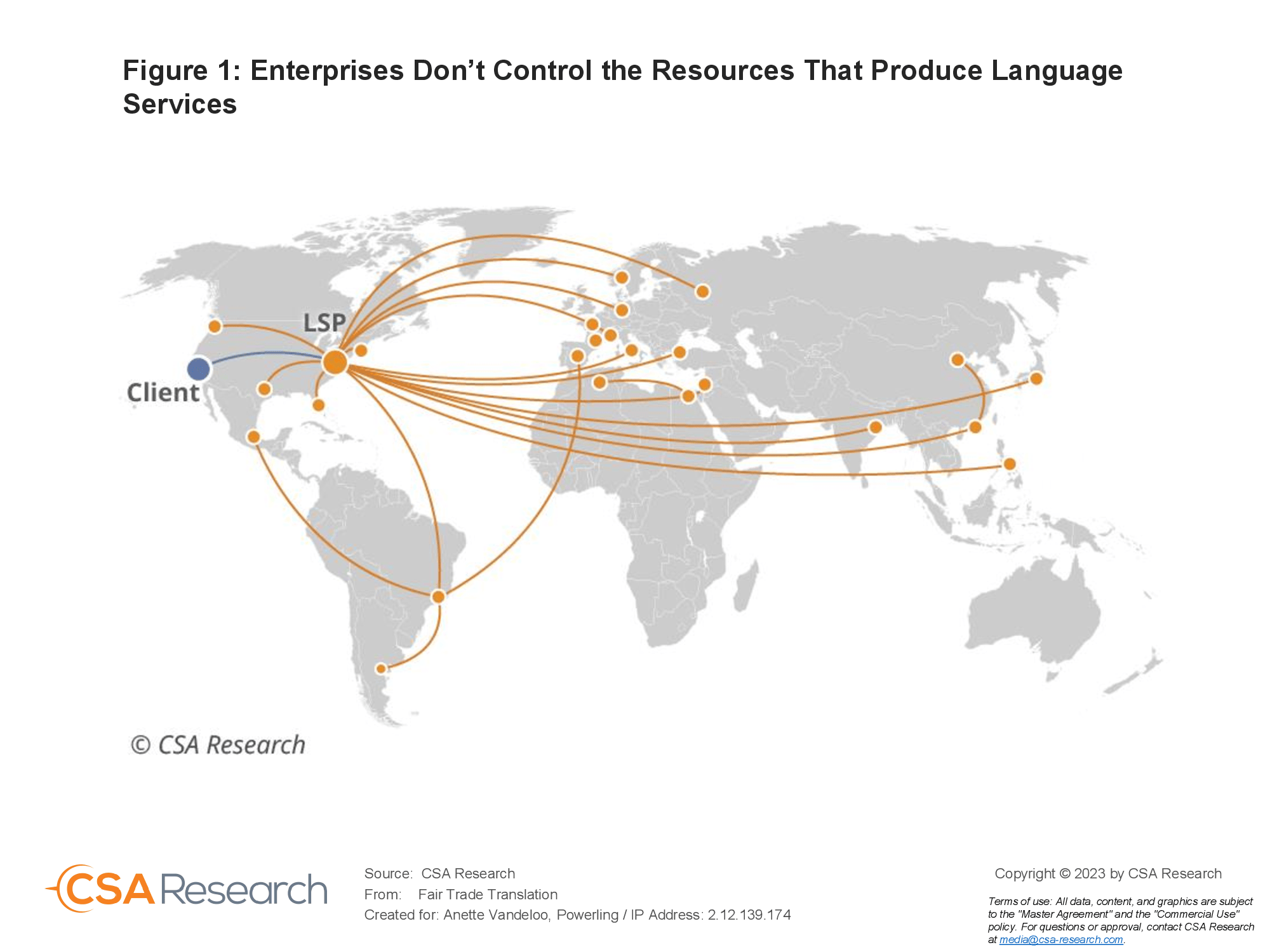When talking about sustainability, we often think about carbon footprint, biodiversity, climate change pollution… But often forget the social and governance aspect of sustainability. The truth is that all of these problems are connected, and while some industries have greatly evolved in the last few years, not many global language providers have a clear stance on sustainability.
“Companies will plant trees but pay their vendors at 80 days. Their ethical values apply only to certain areas of the business.” Common Sense Advisory.
Transparency is key to sustainability
As consumers and buyers, we typically ask where and by whom the cotton from our clothes was produced, also with the food we buy and many other products. But for some reason, many industries are not questioned on how they produce certain products. This is true for language service providers, like Powerling, that rarely get asked by buyers how translations are produced beyond standard process concerns. And when they ask about the individuals working on projects, it is regularly about their qualifications. Most buyers have no clue how translations are produced and in what conditions, and whether labor or human rights were violated to produce this content. This gets complicated with international projects, because of different labor laws around the world, and because so many stakeholders might be involved.

Language service providers will have to become more transparent to help buyers make informed decisions. For example, prices between two companies for the same translation can be very different. It can be caused by many factors, such as the use of automated translation, or even lower margins. But sometimes, it is caused by the difference in salary given to freelance translators. So, how much should a freelance translator be paid? What is a fair price? It is impossible to have a general answer, especially because there are so many factors that make up the price, such as the location and qualification of the freelancer. But it needs to be fair, and it will be the language service provider’s job to work on their sustainability.
Two types of stakeholders: Project Managers and Freelancers
Project managers have the security of employment (if they are not pushed to be freelance) from the translation company, but are often overworked due to increasingly short deadlines, and are often not well compensated for the overtime. (protected by law in most EU countries, but not true for all companies) Project managers are also frequently under a lot of strain because they are typically the ones who deal with clients' tension and anxiety. Some buyers seriously lack decency and courtesy and unload all their anger on PMs. The working environment has also a great influence on work-life quality, and some companies don’t provide the right tools and resources to enable project managers to have healthy work conditions.
Freelancers are, by the very nature of their status, able to accept or reject assignments at will. So have more freedom than project managers, but that comes with other downsides. In most countries, freelance workers are not entitled to unemployment, minimum wages, or other benefits when employed, such as healthcare. On top of that, high-quality freelancers often have to compete with others that propose cheaper rates, and language service providers always push for lower rates, which creates an environment where freelancers are often underpaid. It’s a buyers' market, and because freelance translators can only accept or refuse work, they don’t have a lot of power unless they all unite against “bad buyers” to change the industry. They even now have to deal with crowdsourcing and machine translation, which further weakens translators' ability to receive just compensation for their job.
Buyer, vendor relationship
As with socially responsible manufacturing of a gadget or clothing, or the environmental consciousness about how they are produced, the ethical creation of language services should be important. A clothing company buying translation needs to be strict with language service providers and ask for transparency. But asking for “fair trade translation” is hard when your budget requires you to translate more content, quicker, and for less money. Buyers have to remember that they create overtime conditions when they expect small to midsize suppliers to provide coverage around the clock. And that most language service providers will pay translators less than market rates if the buyer employs an online bidding mechanism to lower already low translation rates.
It is too easy to put all the responsibility on clients, translation companies also have the responsibility to be ethical with the workers that enable them to make business. It is also our job, as global content providers, to educate clients about our supply chain and sustainable practices in our industry. Some Language Service Providers are for example seeking B Corp Certification to make sure they are fully sustainable. Fairtrade in translation will eventually become as important a factor in the selection of language service providers as quality, pricing, timelines, and general business practices.
What are we doing at Powerling
Currently, Powerling is in the process to become a B corp, we also work with Greenly, have created a pledge to improve relationship with freelancers and our own employees. Make sure to refuse unethical work, or work with unrealistic deadlines and expectations, which will put pressure on stakeholders in our supply chain.
If you are looking for a sustainable translation company that can help you make a difference. We are a social enterprise that is committed to helping our clients create a better future for all. We offer sustainable translation services that are designed to help our clients achieve their goals while ensuring that our planet and its people are taken care of. Contact us today to learn more about how we can help you make a difference.
Main source: Is It Time for Enterprises and LSPs to Consider Fair Trade Translation Models?

